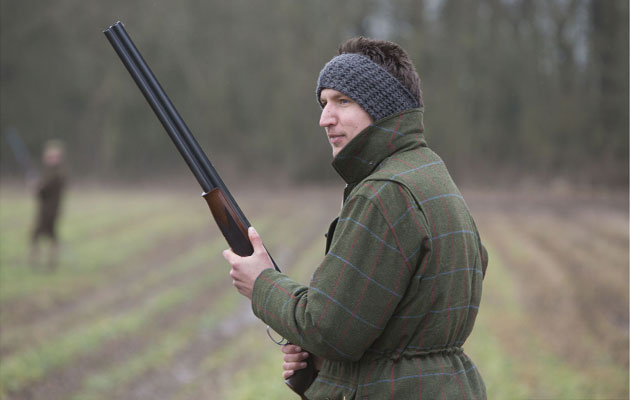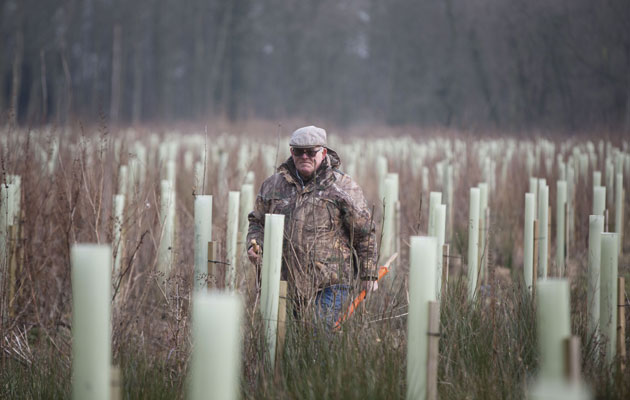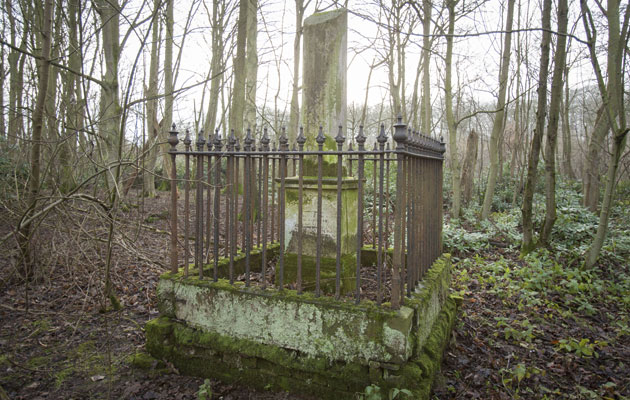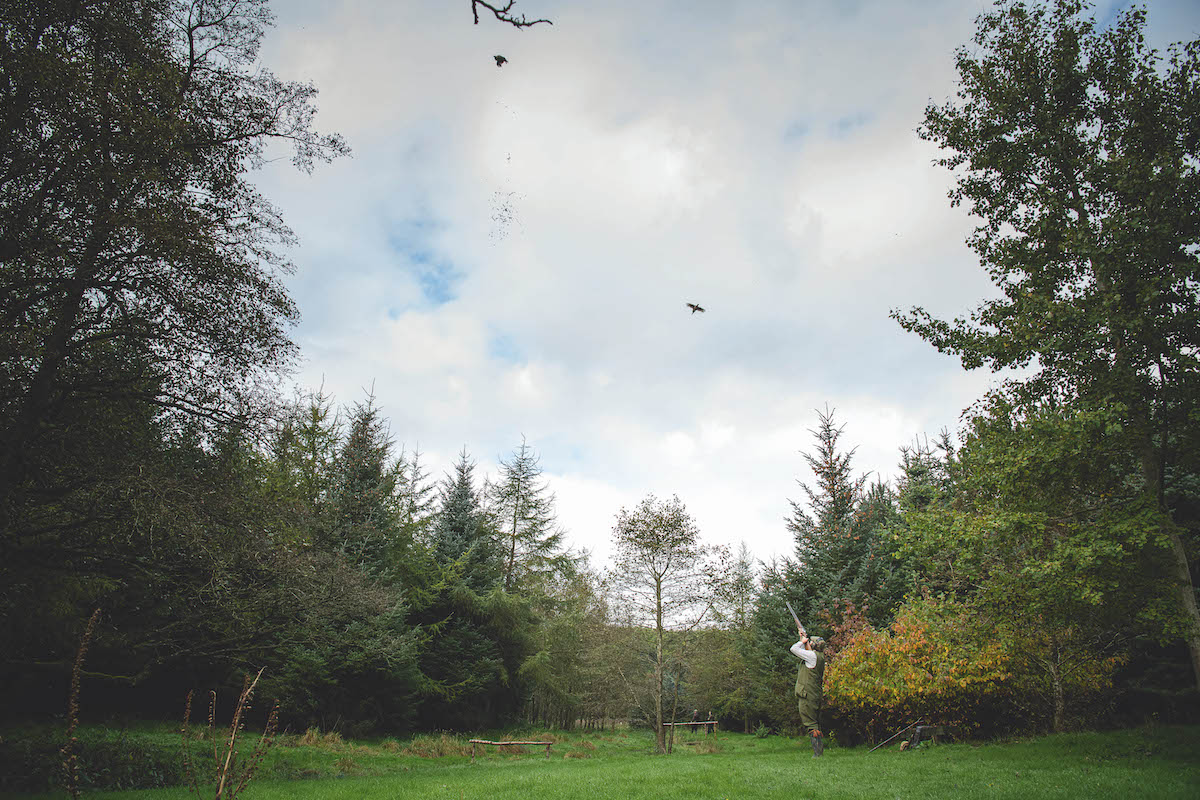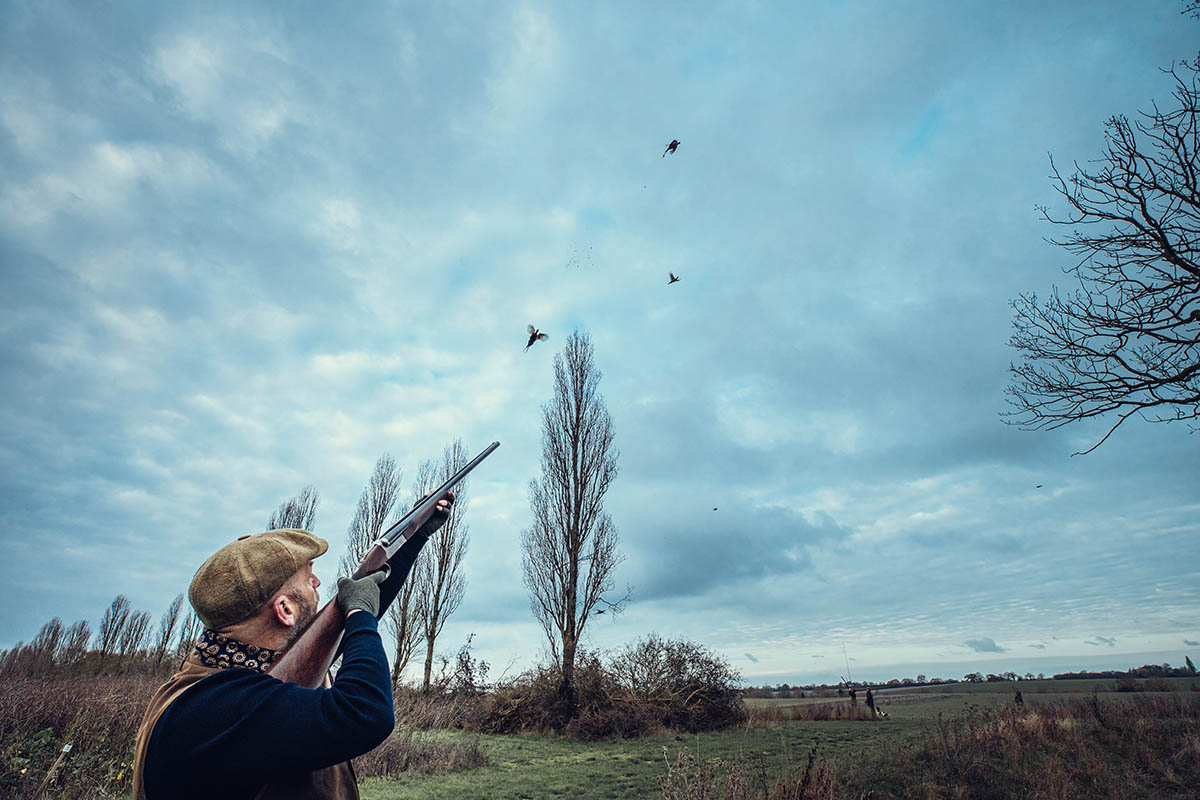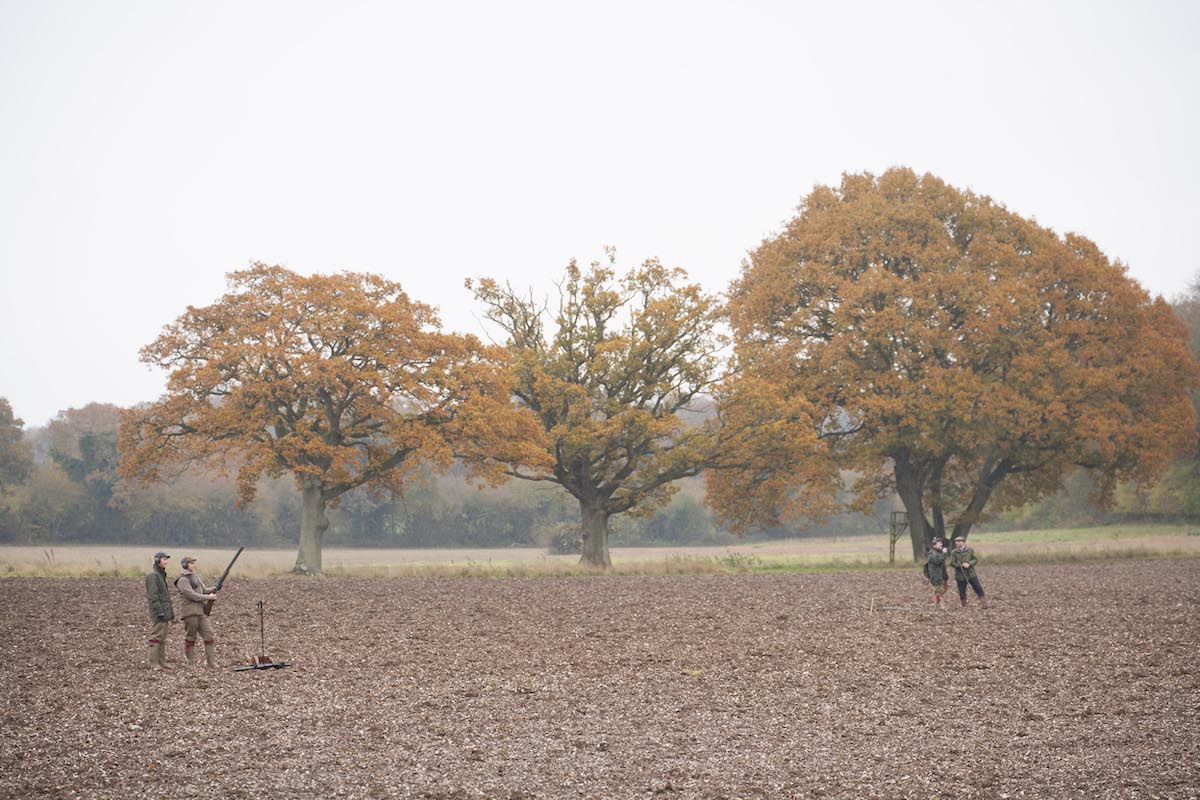Burton Constable shoot, pheasant shooting in East Yorkshire
Burton Constable is a shoot reborn on an estate with links to Moby Dick that was once owned by the late John Chichester-Constable.
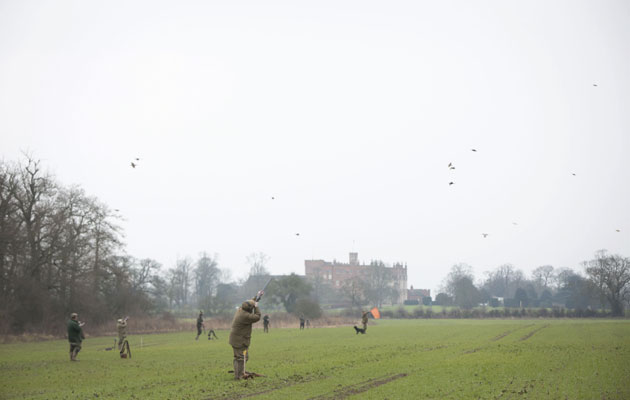
Bakers A. Voase & A. Jones of Preston, East Yorkshire, make the kind of sausage rolls that made your eyes bulge as a child. I used to think I was the only one who hadn’t grown out of this kind of gluttony until I saw the faces of the Burton Constable team during a chilly elevenses when a large bag, its bottom smothered in grease, was slowly drawn out in front of them. As everyone prepared to pounce, I noticed the cheery pig in a stripy apron on the bag’s front with a speech bubble proclaiming: “We bake all the pies”. I don’t know what Messrs Voase and Jones’ pies are like, but their sausage rolls… bloody hell. Goodness knows what the mad scramble for the last one might have been like if a photographer hadn’t been present…
A tale of two countrymen
I had to go through Hull to get to Burton Constable (not to be confused with Constable Burton, 109 miles to the north-west) and began to fret as the start time of the shoot briefing edged closer. According to the satnav I was 15 minutes from my destination yet was in slow-moving traffic in the shadow of the Humber Bridge. Finally I turned off towards open countryside and came to a lane buffered by maize with scores of pheasants on the verges.
While negotiating an icy driveway I met Richard Wastling, shoot captain and 42-year veteran of the Burton Constable estate. Central to Richard’s education at Burton Constable was the late John Chichester-Constable, former estate owner and custodian of its once-neglected Grade I-listed Elizabethan hall whose transformation he spearheaded in 1962.
The estate has been in the Constable family for 700 years and before you even start on the Capability Brown parkland there is the small matter of a red brick mansion containing everything from Chippendale furniture and Lightoler architecture to an 18th century ‘cabinet of curiosities’ packed with fossils and scientific instruments. One notable resident is the 58ft-long skeleton of a sperm whale, which has been at the hall since 1836. Author Herman Melville was so enraptured by the mammal’s carcass that it formed the inspiration for Moby-Dick (Burton Constable is referred to in the novel).
Royal Agricultural College graduate Constable, the 46th Lord Paramount of the Seigneury of Holderness, is astory in himself. Described in his Telegraph obituary as a “colourful and genial squire”, Constable was educated at Eton, witnessed the horror of Belsen when he arrived as part of his father’s Rifle Brigade regiment in 1945, served as High Sheriff of the East Riding of Yorkshire, was the Hospitaller of the Order of Malta, and even briefly managed the 1960s British Invasion band The Hullaballoos.
Constable died in December 2011 aged 84, but even three years on from his death, Richard’s voice was melancholy when he talked of their relationship – one he clearly treasures. Even in death, Richard showed his former employer great respect by always referring to him as “Mr Constable” or “Mr C” and it would be of real benefit to the Burton Constable archivists if Richard committed their working life to paper. Taking someone under one’s wing is an expression that could have been created with Constable and Richard in mind, and from our conversations it was clear this “colourful and genial squire” had plans for someone who started life on the estate as a farmer before a career change in around 1990.
“The land agent retired and I asked Mr Constable who he was going to get in to replace him,” Richard explained. “He looked me straight in the eye and said ‘you’. I told him I didn’t have any qualifications for the job and he said I didn’t need any because most of the job was common sense, adding that if we needed an expert’s opinion we’d get one in. That’s how it started.”
Shooting businesses in Yorkshire
There is more to Yorkshire’s sporting heritage than grouse moors, high pheasants, beautiful scenery and pulling the trigger. Scores of…
Hotels in Yorkshire for shooting parties
From gun cleaning and kennelling to a comfortable bed and a strong selection of local produce on the menu, there…
Clay pigeon shooting in Yorkshire – where should you go?
We’ve listed some of the best clay pigeon shooting in Yorkshire available. Two of the clay grounds featured here have…
Fast-forward to 2013 and circumstances led to Richard taking on the shoot. As someone who had shot over the estate for the previous 25 years, Richard’s knowledge made the journey into shoot management less daunting than it might have been. He never had any ambitions to run the shoot, but it seems the guiding hand of his former employer came into play as he found himself taking on more responsibility and ultimately the task of giving it a new lease of life.
“Having been part of the estate for so long I’ve got the shoot’s best interests at heart,” he said. “The whole job works because I’m responsible for things like woodland management, which has made things so much easier. I could always see potential areas for improvement when others have had the shoot, and our close relationship with tenants [Richard’s son farms 1,200 acres on the estate] means we can experiment with game crops ‘in-house’ without having to seek anyone’s permission.”
The gamekeeper at Burton Constable
Richard would be rudderless without his gamekeeper of four years, Phil Pearson. Phil, with his wife Sarah, works tirelessly to put his knowledge of game farming and a stint at Warter Priory into use at Burton Constable. They haven’t hung around. The shoot now has its own hatchery, which is helping chicks bred from caught-up hens and Polish Bazanties to thrive. The birds are described as “well trained” and Richard knows how lucky he is to have the husband-and-wife team around.
“I wouldn’t be running this shoot if it wasn’t for them,” he said. “Phil is fantastic at rearing game and I’ve never known anyone as athletic as Sarah. She walks miles to fetch the birds. They’ve got full-time jobs and two sons, but you’ll see them all out on weekends and evenings during the summer making sure all is as it should be. We’re a syndicate shoot and every single gun knows the sacrifices the family makes.”
A test of the team’s mettle came during the middle of the season when an energy company was granted access to the estate to perform seismic surveys. “That’s 70 men walking around, digging holes, setting charges and letting them off,” said Richard.
“You can imagine the problems that caused. Birds were constantly being moved around the estate and it was a logistical nightmare. There were times when Phil and Sarah would go to a pheasant pen and it would be empty.”
In the end, as on all finely tuned shoots, those who make Burton Constable tick are the ones who get them through the harder times. The people here know what makes their friends smile: the sloe gin is made by Richard’s partner Sam from berries picked by Eric, Phil’s right-hand man. There was a seemingly endless supply of chocolate and the conversation regularly turned a wait-until-I-tell-your-wife-what-you’ve-just-said dark blue. Everyone knows everyone, so nobody has to tip-toe around anything other than the dogs. From the slightly mysterious Caoimhe Gordon, who I chatted to before the start of a snap shooting frenzy at Moors to Marton, to the elderly gentleman working his cocker on Salt End, everyone was able to add their own nugget of information about the shoot.
Changing times
Though the sporting rights cover 3,500 acres at Burton Constable, the shooting is mainly concentrated on 250 acres of woodland and gently rolling farmland at its centre. There are 25 drives on the estate, mostly established for well over a quarter of a century. That’s not to say the shoot stands on ceremony. When Richard took the shoot on, one of his first tasks was to catch-up the 2,000 birds whose quality was falling with each passing season and to sell them, starting again with the Polish Bazanties.
The scale of the project must have made the team nervous but the gamble looks to be paying off, thanks in no small part to Phil’s husbandry skills. There was still the matter of finding the guns to shoot them, however. Richard conceded that his first season was slow with a few blank days, despite two existing (if depleted) syndicate teams taking the majority of them. Nevertheless, news soon spread that Richard was at the helm and in a few short seasons the syndicates became full again to the point they are now over-subscribed. The birds are in demand too, with Richard happy to supply pheasants to neighbouring shoots in return for feed.
But there are still challenges to face. Richard explained: “When the game crops were at full strength earlier in the season, it was much easier to rotate the drives but the pool shrank rapidly by winter. We put too much triticale out and not enough maize. It didn’t last as long as we’d have liked so we’ve had to rely on our woodland drives sooner than I wanted. Next year we’ll be planting maize and probably something else that will work better with it.”
Key to Burton Constable’s rebirth has been variety in the shooting and the new format of the day. When Richard first shot here as a tenant farmer, the guns would take lunch in the hall’s cafe. While lunch is still a cordial affair, these days Richard doesn’t like to get too bogged down in port and puddings.
“I’m not a fan of stopping for a big lunch,” he explained. “It spoils things for me because it takes too long to get everyone’s boots off and sat down and before you know it, it’s getting dark and the day has lost all momentum.”
The lie of the land at Burton Constable means the birds are by no means screamers, but with well-drilled beaters getting their angles right so often during our visit, guns needed to have their wits about them.
The past, the future
Does Richard ever have Mr C in his ear when making his decisions? Does he ever go to the beautifully restored walled garden where a Churchillian statue of his former mentor surveys the changing face of his ancestral home to ask for his advice?
“Mr Constable was insistent about how he wanted things to be left after he’d gone,” said Richard. “He certainly left the estate in a lot better condition than he found it. The shoot was never really a part of his legacy, but I think he would be pleased with how it’s being run.”









